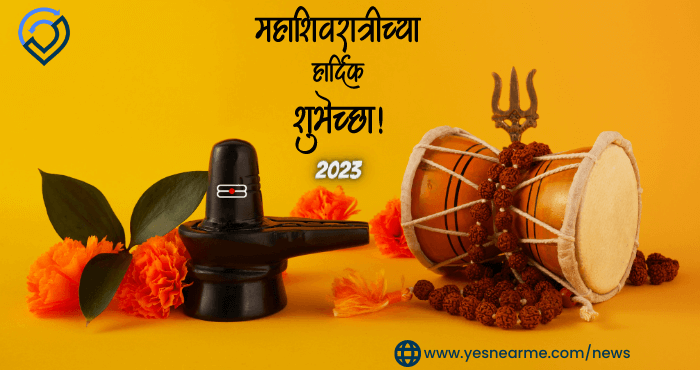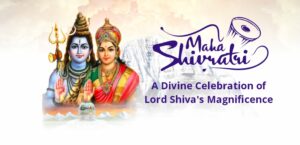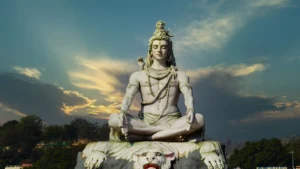
‘,’
‘ ); } ?>
Table of Contents
Maha Shivaratri: A Night of Devotion, Meditation and Blessings
 Maha Shivaratri is one of the most significant and auspicious festivals in Hinduism, dedicated to Lord Shiva, the supreme destroyer and transformer in the Hindu Trinity (Trimurti). The term “Maha Shivaratri” translates to “The Great Night of Shiva,” and it is celebrated annually, usually falling in the month of Phalguna (February–March) on the 14th night of the new moon.
Maha Shivaratri is one of the most significant and auspicious festivals in Hinduism, dedicated to Lord Shiva, the supreme destroyer and transformer in the Hindu Trinity (Trimurti). The term “Maha Shivaratri” translates to “The Great Night of Shiva,” and it is celebrated annually, usually falling in the month of Phalguna (February–March) on the 14th night of the new moon.
This sacred night holds immense spiritual significance, as it is believed to be the night when Lord Shiva performed the Tandava dance, symbolizing the creation, preservation, and destruction of the universe. It is also the night when Lord Shiva married Goddess Parvati, symbolizing the union of the divine masculine and feminine energies.
Spiritual Significance:
Maha Shivaratri is a night of deep meditation, prayer, and fasting, aimed at seeking Lord Shiva’s blessings for inner peace, spiritual growth, and the removal of sins. Devotees often stay awake throughout the night, chanting mantras like “Om Namah Shivaya”, performing rituals, and offering prayers to Lord Shiva. It is believed that worshipping Lord Shiva on this night can bring about liberation (moksha), prosperity, and spiritual awakening.
Rituals and Celebrations:
- Fasting: Devotees often fast on this day, consuming only water or fruits, and many observe a nirjala vrat, meaning fasting without even water.
- Night Vigil: The main feature of the night is staying awake and offering prayers, chanting, and performing Abhishek (ritual bathing) of Lord Shiva’s idol with milk, honey, and water.
- Temple Celebrations: Temples dedicated to Lord Shiva are decorated, and special prayers, aartis, and rituals are conducted. Devotees flock to temples to perform worship and receive blessings.
Maha Shivaratri is not just a physical observance but also a deeply spiritual occasion where followers connect with the divine through intense devotion, self-discipline, and inner reflection. The festival is celebrated with great fervor across India and by Hindus worldwide, uniting people in their devotion to Lord Shiva.
 Maha Shivaratri is celebrated to honor and worship Lord Shiva, one of the principal deities in Hinduism, representing destruction, transformation, and regeneration. This sacred night holds deep spiritual significance and is observed for various reasons:
Maha Shivaratri is celebrated to honor and worship Lord Shiva, one of the principal deities in Hinduism, representing destruction, transformation, and regeneration. This sacred night holds deep spiritual significance and is observed for various reasons:
1. The Night of Divine Energy:
Maha Shivaratri is believed to be the night when Lord Shiva performed the Tandava, a cosmic dance representing the creation, preservation, and destruction of the universe. It is the night when the energy of the universe aligns with the divine energy of Lord Shiva. Devotees believe that by worshiping Lord Shiva on this night, they can harness his divine energy for transformation and spiritual growth.
2. The Night of Lord Shiva’s Marriage to Goddess Parvati:
Another important reason for celebrating Maha Shivaratri is the belief that it marks the divine marriage of Lord Shiva and Goddess Parvati, symbolizing the union of the divine masculine and feminine energies. Their union is considered a symbol of balance, harmony, and creation. Celebrating this union is believed to bring peace, prosperity, and harmony in one’s life.
3. Overcoming Darkness and Ignorance:
The word “Shivaratri” means “the night of Shiva,” and the night represents overcoming darkness (ignorance) and embracing light (knowledge). Devotees observe a night vigil (stay awake and meditate), symbolizing the victory of wisdom and consciousness over ignorance and negativity. It is a time for personal reflection and spiritual awakening.
4. Spiritual Awakening and Liberation (Moksha):
Maha Shivaratri is seen as a night of spiritual awakening. By staying awake, chanting mantras like “Om Namah Shivaya”, and meditating on Lord Shiva’s attributes, devotees seek his blessings for liberation (moksha) from the cycle of birth and death. It is believed that fasting, praying, and focusing on spiritual practices on this day will purify one’s mind and soul and help them move toward liberation.
5. The Significance of the Shiva Lingam:
The Shiva Lingam, representing Lord Shiva, is the central object of worship on Maha Shivaratri. The worship of the Shiva Lingam symbolizes the infinite and formless nature of Lord Shiva. Devotees offer milk, honey, water, and other sacred items to the Shiva Lingam as a way of showing reverence and devotion.
6. The Power of Fasting and Self-Discipline:
On Maha Shivaratri, many devotees observe a fast (vrat) to cleanse the body and mind. Fasting is not just about abstaining from food but also about gaining control over desires, thoughts, and actions. It is a way to purify the soul and gain spiritual strength, which is why many people refrain from eating, speaking ill, or indulging in worldly distractions.
7. Destroying Negativity and Attaining Peace:
Maha Shivaratri is a time to rid oneself of negative energies, sins, and obstacles. Devotees believe that by praying to Lord Shiva and observing rituals on this auspicious night, they can eliminate all negativity, ill health, and suffering in their lives, and invite peace, prosperity, and blessings.
8. A Symbol of Devotion:
The festival also teaches the significance of devotion and faith. Through selfless devotion, staying awake the entire night, and performing prayers with sincerity, devotees can draw closer to the divine and develop a stronger connection with Lord Shiva.
How Maha Shivaratri is traditionally celebrated?
 Maha Shivaratri is a sacred festival dedicated to Lord Shiva, observed with great devotion and reverence by Hindus worldwide. The celebration of Maha Shivaratri involves several rituals, fasting, and spiritual practices that help devotees connect with Lord Shiva, seek his blessings, and attain spiritual growth. Here’s how Maha Shivaratri is traditionally celebrated:
Maha Shivaratri is a sacred festival dedicated to Lord Shiva, observed with great devotion and reverence by Hindus worldwide. The celebration of Maha Shivaratri involves several rituals, fasting, and spiritual practices that help devotees connect with Lord Shiva, seek his blessings, and attain spiritual growth. Here’s how Maha Shivaratri is traditionally celebrated:
1. Fasting (Vrat) and Abstinence:
- Fasting is an essential part of the celebration. Many devotees observe a nirjala vrat (fast without water) or consume only fruits, milk, or certain light foods throughout the day.
- Abstinence from worldly pleasures: Devotees also refrain from activities like eating non-vegetarian food, drinking alcohol, or indulging in entertainment. The focus is on spiritual practices, prayer, and devotion.
2. Night Vigil (Jagran):
- The central event of Maha Shivaratri is the night vigil. Devotees stay awake throughout the night, offering prayers, chanting mantras, and engaging in meditation. This practice is believed to help them connect with Lord Shiva’s divine energy and attain spiritual awareness.
- The night vigil symbolizes overcoming darkness (ignorance) and embracing the light of knowledge and wisdom.
3. Chanting of Mantras:
- Devotees chant “Om Namah Shivaya”, which is considered one of the most powerful mantras dedicated to Lord Shiva. The repetition of this mantra purifies the mind and soul.
- Many people also chant the Shiva Stotra, Shiva Ashtakshara Mantra, or other hymns praising Lord Shiva throughout the night.
4. Performing Abhishek (Ritual Bathing of the Shiva Lingam):
- The Shiva Lingam is the central object of worship on Maha Shivaratri. Devotees offer milk, honey, water, ghee, and other sacred items to the Shiva Lingam. This ritual is called Abhishek, and it symbolizes the offering of one’s devotion and gratitude to Lord Shiva.
- Abhishek is often performed early in the morning, with devotees chanting mantras and offering prayers.
5. Offering Bilva Leaves and Flowers:
- Bilva leaves (Bael leaves) are sacred to Lord Shiva, and offering them to the Shiva Lingam is considered highly auspicious. Devotees place three Bilva leaves on the Lingam, symbolizing the three eyes of Lord Shiva (past, present, and future).
- Flowers, particularly white flowers, are also offered as a sign of purity and devotion.
6. Visiting Temples:
- Devotees gather in temples dedicated to Lord Shiva, especially the Jyotirlingas, which are considered the most sacred Shiva temples in India. They participate in special prayers, aarti, and other rituals conducted on this auspicious day.
- In some temples, the Shiva Lingam is bathed with milk, honey, water, and sandalwood paste. Devotees join in chanting and singing devotional songs, creating a deeply spiritual atmosphere.
7. Reciting the Story of Maha Shivaratri:
- Reciting or listening to the story of Maha Shivaratri is also an important part of the celebration. The story narrates the significance of the night, the marriage of Lord Shiva and Goddess Parvati, and the divine grace Lord Shiva bestows upon his devotees.
8. Meditation and Prayer:
- The night is spent in intense meditation and prayer, focusing on the divine qualities of Lord Shiva. Many people also perform pranayama (breathing exercises) or engage in deep dhyana (meditative contemplation) to connect with the divine.
- Shiva Bhajans and Kirtans are sung throughout the night, invoking the blessings of Lord Shiva.
9. Special Pujas and Rituals:
- Pujas are conducted in Shiva temples and homes. Priests perform special rituals to honor Lord Shiva, invoking his blessings for spiritual growth, prosperity, and protection from evil.
- Fire offerings and havan (yajna) are also common on Maha Shivaratri, where devotees offer prayers to Lord Shiva through fire rituals.
10. Sharing and Charity:
- Charity (daan) is an important part of the celebrations. Many devotees engage in acts of kindness by donating food, clothes, or money to the needy. This is considered a way of invoking Lord Shiva’s blessings.
The Spiritual Significance of Celebrating Maha Shivaratri:
- Spiritual Awakening: Maha Shivaratri offers an opportunity for devotees to purify their minds and souls, to reflect on their past actions, and to make a fresh start.
- Transformation: The festival symbolizes transformation and spiritual growth. It is a time when devotees overcome their weaknesses, ignorance, and negative traits, seeking spiritual enlightenment.
- Connection with the Divine: The night of Maha Shivaratri is considered the most auspicious time for communion with Lord Shiva, and the rituals are designed to strengthen the devotee’s bond with the divine.
महाशिवरात्री ची पुराणकथा – Mahashivratri Story
ज्यावेळी समुद्र मंथन झाले त्यात सृष्टीशी निगडीत सर्व महत्वपुर्ण गोष्टींची निर्मीती झाली परंतु त्याचवेळी समुद्रमंथनातुन हलाहल विष देखील बाहेर आले.
या विषात ब्रम्हांडाला नष्ट करण्याची ताकद होती. आणि या विषाला नष्ट करण्याची क्षमता केवळ भगवान शिवांमधेच होती त्यामुळे त्यांनी हे हलाहल विष प्राशन करून ब्रम्हांडाला वाचवले.
पण विष प्राशन केल्यामुळे त्यांचा कंठ निळा झाला व संपुर्ण देहाचा दाह होत होता. वैद्यांनी भगवान शिवांना संपुर्ण रात्र जागुन काढण्याचा उपाय सांगितला.
सर्व देवांनी भगवान शिवांना बरे वाटावे म्हणुन रात्रभर गायन आणि नृत्याची व्यवस्था केली. सकाळी महादेवांनी सर्वांना आशिर्वाद दिला. या संपुर्ण घटनाक्रमामुळे सृष्टी वाचली म्हणुन या दिवसाला महाशिवरात्री असे म्हंटले जाते.
अंगाच्या होत असलेल्या दाहामुळे भगवान शिवांनी या दिवशी तांडव नृत्य देखील केले होते.
महाशिवरात्री या दिवशी भाविक संपुर्ण दिवस उपवास करतात. भगवान शिवांचे शिवलिलामृत, महारूद्र, भजन, गायन इत्यांदिचे आयोजन केले जाते. भगवान शिवाचे दर्शन घेउन त्यांचा कृपाप्रसाद मिळवण्याकरीता आराधना केली जाते.
शिवाच्या मंदिरांमधे महाशिवरात्रीला मोठया संख्येने भाविकांची गर्दी दिसुन येते.
बारा ज्योर्तिलिंग ज्या ज्या ठिकाणी आहे तेथे तर लाखोंच्या संख्येने भाविक महाशिवरात्रीला दर्शन घेण्याकरता जमा होतात.
भगवान शिवाचे ज्या ज्या ठिकाणी तिर्थक्षेत्र आहेत तेथे मोठयामोठया यात्रा भरतात.
शिवशंकराला 108 बेल वाहुन शिवनामावली देखील उच्चारली जाते. महाशिवरात्रीला काटेधोत्र्याचे फुल भगवान शंकराला वाहाण्याची देखील पध्दत आहे. विदर्भात आजच्या दिवशी घोंगलाचे फुल शिवाला वाहाण्याची परंपरा आहे.
शिवकृपा प्राप्त होण्यासाठी ‘ओम नमः शिवाय’ हा जप जास्तीत जास्त करावा . . . .
भगवान शिवाला ‘भोळा शंकर’ देखील म्हंटलेले आहे. उपासना केल्यावर त्वरीत प्रसन्न होणारा आणि ईच्छित फळ देणारा हा महादेव सर्वांचे कल्याण करणारा आहे. शिवपुराणात एक कथा सांगितली जाते ती अशी . . .
शिवपुराणातील कथा – Shiv Puran Story
एक पारधी जंगलात सावज शोधण्याकरता झाडावर बसला होता. संपुर्ण दिवस गेला परंतु त्याला शिकार गवसली नाही. सायंकाळी हरणांचा एक कळप तेथे पाणी पिण्याकरता आला पारधी बाण सोडणार तेवढयात त्यातील एक हरीण पुढे येउन पारध्याला म्हणाला
‘हे पारध्या तु बाण सोडणार आणि आमची शिकार करणार हे अटळ आहे परंतु मी तुला एक विनंती करतो मला माझ्या कुटुंबाला एकदा भेटुन येऊ दे, माझी कर्तव्ये मला पार पाडुन येउ दे’, हरणाने वचन दिल्याने पारध्याने त्यांची विनंती मान्य केली.
दुरवरून मंदिरातील घंटांचे आवाज येत होते ओम नमः शिवाय कानावर येत होते. पारधी ज्या झाडावर बसला होता ते झाड बेलाचे होते.
सहज चाळा म्हणुन एक एक पान तो खाली टाकत होता त्या झाडाखाली असलेल्या शिवपिंडीवर ती बेलाची पानं पडत होती. नकळत का होईना त्या पारध्याच्या हातुन शिवउपासना घडली.
हरीण परत आल्यानंतर त्याने पारध्याला म्हंटले ’की आता मला मार मी माझे कुटूंब प्रमुख असल्याचे कर्तव्य बजावुन आलो आहे तेंव्हा लगेच हरणी पुढे आली आणि तीने म्हंटले ‘त्यांना नको मला मार मला माझे पत्नीधर्माचे कर्तव्य पार पाडायचे आहे’
त्वरीत हरणाची लहान पिल्लं पुढे आली आणि म्हणाली ‘आईला नको आम्हाला मार आम्हाला आमचे पुत्रधर्माचे कर्तव्य पार पाडूदे’
ते पाहाता पारध्याच्या मनात विचार आला हे प्राणीमात्र असुन देखील आपापल्या कर्तव्याला चुकत नाहीत तर मी माझा मानवधर्म, दयाधर्म का सोडु? त्याने सर्वांना जीवदान दिले.
देवाधिदेव महादेव हे सर्व पाहुन हरणावर आणि पारध्यावर प्रसन्न झाले आणि त्यांनी त्या सर्वांना कृपाआशिर्वाद दिला.
सर्वांचा उध्दार केला हरिणाला मृग नक्षत्र म्हणुन व पारध्याला व्याघ्र नक्षत्र म्हणुन अवकाशात नेहमीकरता स्थान दिले. हा प्रसंग ज्या समयास घडला तो दिवस महाशिवरात्रीचा होता . . . .
Mahashivrati wishes in Marathi:
ॐ त्रियम्बकं यजामहे,सुगन्धिं पुष्टिवर्धनं !उर्वारुकमिव बन्धनान्मृत्योर्मोक्षिय मामृतात् ! महाशिवरात्रीच्या हार्दिक शुभेच्छा !
काल पण तूचमहाकाल पण तूचलोक ही तूचत्रिलोकही तूचशिव पण तूचआणि सत्यही तूच जय श्री महाकाल हर हर महादेव.
कैलासराणा शिव चंद्रामौळीफणीद्रं माथा मुकुटीं झळाळीकारुण्यसिंधु भवदु:खहारीतुजवीण शंभो मज कोण तारी महाशिवरात्रीच्या हार्दिक शुभेच्छा!
बेलाचे पान वाहतो महादेवाला,करतो वंदन दैवताला ,सदा सुखी ठेव माझ्या प्रिय जनांनाहिच प्रार्थना शिव शंभो शंकराला महाशिवराञी च्या शुभेच्छा.ॐ नमः शिवाय.
कारुण्य सिंधु भव दु:ख हारी..तुज विण शंभु मज कोण तारी हर हर महादेव महाशिवरात्रीच्या हार्दिक शुभेच्छा !
तुमच्या आयुष्यातील सर्वदुःख पळून जावो,महादेवांच्या कृपेने सुख तुमच्या दारी येवो..तुम्ही सदा आनंदी राहो हीच एक ईच्छा, तुम्हाला आणि तुमच्या कुटुंबालामहाशिवरात्रीच्या खूप खूप शुभेच्छा.
Mahashivratri wishes in Hindi:
शिव की भक्ति से नूर मिलता है
सबके दिलों को सुकून मिलता है
जो भी लेता है दिल से भोले का नाम
उसे भोले का आशीर्वाद जरूर मिलता है
जय भोलेनाथ
महाशिवरात्रि की हार्दिक शुभकामनायें
भोले की महिमा है अपरम्पार
करते हैं अपने भक्तों का उद्धार
शिव की दया आप पर बनी रहे
और आपके जीवन में खुशियां भरी रहें
शिव की शक्ति
शिव का जाप
और खुशियों का संसार मिले
इस शिवरात्रि के उत्सव पर
आपको कामयाबी की नयी शुरुआत मिले
Maharashivtari wishes in Sanskrti:
- ओम, मैं देवताओं के महानतम, आदर्श पुरूष, महादेव पर ध्यान करता हूं।
भगवान रुद्र, बुद्धि के साथ हमें आशीर्वाद दें और ज्ञान के साथ उजागर करें।। - ॐ नमो भगवते रूद्राय । Happy Maha Shivratri 2023।।
- ॐ तत्पुरुषाय विद्महे महादेवाय धीमहि तन्नो रुद्रः प्रचोदयात ।
Wishing you a very Happy Maha Shivratri 2023।। - करचरणकृतं वाक् कायजं कर्मजं वा श्रवणनयनजं वा मानसंवापराधं ।
विहितं विहितं वा सर्व मेतत् क्षमस्व जय जय करुणाब्धे श्री महादेव शम्भो ।।
Happy Shivratri 2023।।
- ॐ त्र्यम्बकं यजामहे सुगन्धिं पुष्टिवर्धनम्,
उर्वारुकमिव बन्धनान्मृत्योर्मुक्षीय माऽमृतात्।।
Happy Maha Shivratri 2023।।
- मृत्युञ्जयाय रुद्राय नीलकन्ताय शंभवे,
अमृतेषाय सर्वाय महादेवाय ते नमः।।
Happy Shivratri 2023।।
- कर्पूरगौरं करुणावतारं, संसारसारम् भुजगेन्द्रहारम् ।
सदावसन्तं हृदयारविन्दे, भवं भवानीसहितं नमामि ॥
Happy Maha Shivratri 2023।।
- May all your wishes be granted by Lord Shiva! Wish you and your family a very happy Maha Shivratri. Happy Maha Shivratri 2023.
Conclusion:
To know more read more above.
If u like this article you do like this Kargil vijay diwas quotes
And for more information en.wikipedia.org
